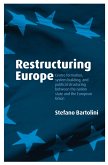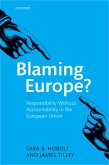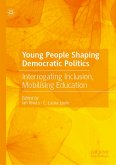France and Germany have played a pivotal role in the history and politics of European integration. Yet, paradoxically, a study that systematically investigates the interrelated reality of Franco-German bilateralism and multilateral European integration has been conspicuously lacking. Formulating an approach the authors call "embedded bilateralism", this book offers exactly that. It scrutinizes in empirical and historical detail the bilateral Franco-German order and France and Germany's joint role in shaping Europe over the past half century. The book addresses two key questions regarding France and Germany in Europe from the Elys?e Treaty to the twenty-first century: Why have France and Germany continued to hang together in an especially tight relationship for over five decades amidst frequently dramatic domestic change, lasting differences, and fundamental international transformation? And why has the joint Franco-German impact on shaping Europe's polity and European policies, while fundamental, proved so uneven across political domains and time? In answer to the first question, Shaping Europe argues that the actions and practices of the Franco-German order-its regularized bilateral intergovernmentalism, symbolic acts and practices, and parapublic underpinnings-together have rendered this bilateral connection historically resilient and politically adaptable. Regarding the second question, the book holds that different combinations of a limited number of factors located at the bilateral, domestic, regional European, and international levels explain central aspects of variation. Together, these factors condition and modulate France and Germany's joint impact on Europe. In pursuing its research questions, theoretical work, historical reconstructions, and empirical analyses, Shaping Europe fruitfully combines the study of European integration, EU politics and policymaking, Franco-German affairs, and French and German politics with general theorizing and conceptual grounding in international relations and political science.
Dieser Download kann aus rechtlichen Gründen nur mit Rechnungsadresse in A, B, BG, CY, CZ, D, DK, EW, E, FIN, F, GR, HR, H, IRL, I, LT, L, LR, M, NL, PL, P, R, S, SLO, SK ausgeliefert werden.









